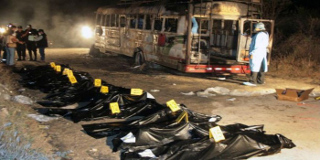US Bomb Pieces Found at Yemen Bus Strike Site as Pentagon Says ‘We May Never Know’ Who Supplied It

Note to readers: please click the share buttons above
A Raytheon Mark 82 general-purpose free-fall bomb was likely used by the Saudi-led coalition to strike a bus full of children in Yemen on Thursday, a local journalist claims, after bomb fragments from the scene were recovered.
The Saudi-led coalition struck a school bus in the Dahyan area of the Houthi-controlled Saada province last Thursday, leaving 51 dead, most of them children, and injuring at least 79 others. Just as the dust was settling at the scene of the strike with charred bodies being recovered, locals found fragments of the bomb used.
Harrowing images from the site, shared by journalist Nasser Arrabyee, show fragments that appear to be from the 500-pound MK-82 bomb, which the US continues to sell to Saudi Arabia.
The remnants of the US bombs that killed Yemen children in the latest US-Saudi massare and war crime of August 9th, 2018
In Saada north Yemen. pic.twitter.com/z8bvadwncG
— Nasser Arrabyee (@narrabyee) August 11, 2018
While the photo of the fragments has yet to be independently verified, pieces of MK-82 bombs have surfaced repeatedly amid the ongoing Yemen bombing campaign. The MK-82 made shocking headlines in 2016 when the Saudi-led coalition bombed a community hall in Sanaa during a funeral for Sheikh Ali al-Rawishan, killing more than 140 people and wounding 525 others.
Despite repeated calls by NGOs and even US lawmakers to halt arms supplies to the Saudis amid the ongoing conflict, in 2016 and 2017, the Pentagon went on to award Lockheed Martin/General Dynamics key contracts to supply the MK-82 500-pound bombs to the Arab coalition.
Yemeni journalists found this fragment of the bomb Saudi Arabia dropped on a school bus full of children in Yemen https://t.co/ooLcwBpMwZ
It's a US-made MK-82 guided bomb, which has been used in previous attacks on Yemeni civilians
The cage code on the bomb is Lockheed Martin's pic.twitter.com/Wu6OSZeKJ2
— Ben Norton (@BenjaminNorton) August 11, 2018
Yet, despite the apparent arms sale trail between Washington and Riyadh, the Pentagon advised earlier this week that it might be impossible to tell where the bomb that annihilated the school bus came from. In 2016, the US approved MK-82 sales to Saudi Arabia, United Arab Emirates, France, and Iraq, while extending the deal to Australia and Bahrain the following year.
“We may never know if the munition [used] was one that the US sold to them,”Army Maj. Josh Jacques, a spokesperson for US Central Command, told Vox. “We don’t have a lot of people on the ground.”
*
Featured image is from Antiwar.com

